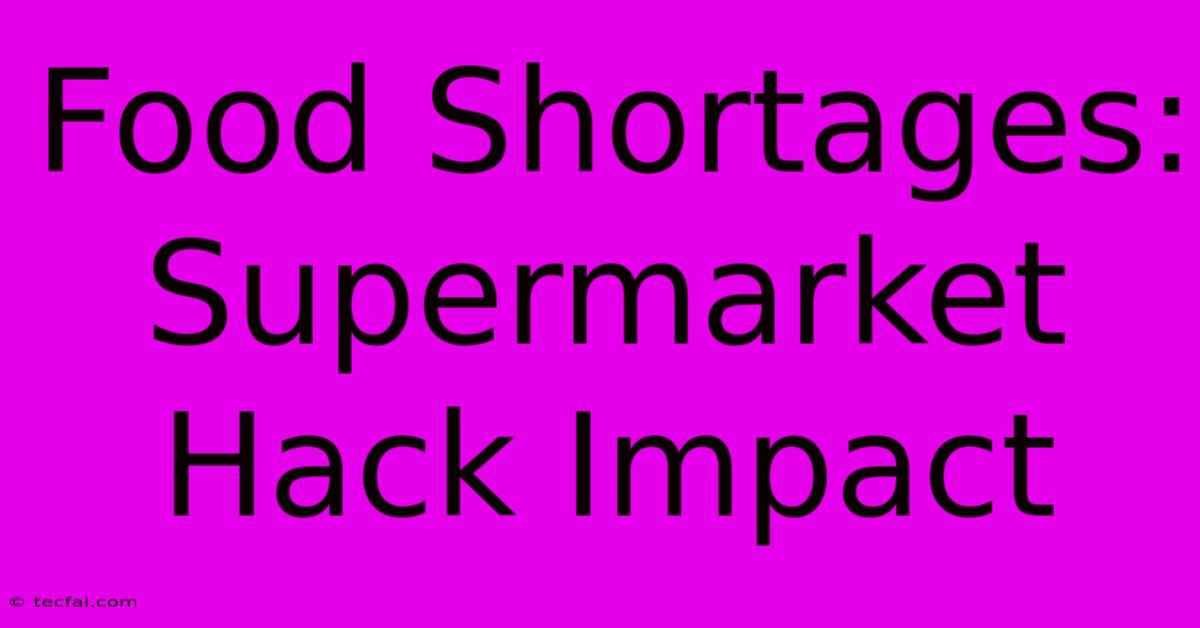Food Shortages: Supermarket Hack Impact

Discover more detailed and exciting information on our website. Click the link below to start your adventure: Visit Best Website tecfai.com. Don't miss out!
Table of Contents
Food Shortages: The Impact of Supermarket Hacks and Supply Chain Vulnerabilities
The recent surge in food prices and reports of empty shelves have sparked widespread concern about food security. While multiple factors contribute to these shortages, from climate change to geopolitical instability, the vulnerability of our supermarket supply chains to cyberattacks – what we term "supermarket hacks" – is a frequently overlooked but increasingly significant threat. This article explores the impact of these hacks on food availability and offers insights into mitigating future risks.
Understanding the Supermarket Supply Chain's Digital Dependence
Modern supermarkets rely heavily on sophisticated technology. From inventory management and logistics to point-of-sale systems and supplier communication, digital systems are the backbone of efficient food distribution. This digital dependence, while offering numerous benefits in terms of efficiency and cost-effectiveness, creates a significant weak point: vulnerability to cyberattacks.
- Inventory Management Systems: A successful hack targeting these systems could lead to inaccurate stock levels, resulting in overstocking of certain items while others are depleted. This can disrupt supply chains and lead to shortages.
- Logistics and Transportation: Attacks on transportation management systems can disrupt delivery schedules, leaving shelves empty. Real-time tracking, routing optimization, and communication with drivers all rely on connected systems that are potential targets.
- Payment Processing Systems: While not directly impacting food availability, disruptions to payment systems can bring supermarket operations to a halt, impacting customer access to goods.
- Supplier Communication Networks: Compromised communication channels can hinder timely ordering and delivery of products, leading to gaps in supply.
Types of Supermarket Hacks and their Consequences
The potential consequences of supermarket hacks range from minor inconveniences to widespread food shortages. These attacks can take several forms:
- Ransomware Attacks: These attacks encrypt vital data, effectively shutting down operations until a ransom is paid. This can lead to temporary closures and significant disruption to the supply chain.
- Data Breaches: Stolen customer data, supplier information, or internal operational details can have severe consequences, including financial losses and reputational damage. While not directly causing food shortages, the disruption can indirectly lead to them.
- Denial-of-Service (DoS) Attacks: These attacks flood a system with traffic, rendering it inaccessible. This can disrupt online ordering systems, payment processing, and other critical functions.
- Supply Chain Attacks: Targeting suppliers or distributors through phishing or malware can disrupt the flow of goods long before they reach supermarket shelves.
Mitigating the Risk: Strengthening Supermarket Cybersecurity
Addressing the vulnerability of supermarket supply chains requires a multi-pronged approach focusing on robust cybersecurity measures:
- Investing in Advanced Security Technologies: This includes robust firewalls, intrusion detection systems, and endpoint protection solutions designed to detect and prevent cyberattacks.
- Employee Training and Awareness: Educating employees about phishing scams, malware threats, and other cybersecurity risks is crucial in preventing attacks.
- Regular Security Audits and Penetration Testing: Proactive security assessments can identify vulnerabilities before they can be exploited.
- Data Backup and Disaster Recovery Planning: Having robust data backup and disaster recovery plans in place allows for quick recovery in case of an attack.
- Supply Chain Security Collaboration: Supermarkets need to work closely with their suppliers and logistics partners to implement security best practices across the entire supply chain.
Conclusion: The Urgent Need for Proactive Measures
Food shortages are a complex issue with multiple contributing factors. However, the vulnerability of supermarket supply chains to cyberattacks should not be underestimated. By investing in robust cybersecurity measures and fostering collaboration across the entire food supply chain, we can mitigate the risk of supermarket hacks and ensure a more resilient and secure food system. The time for proactive measures is now; inaction will only amplify the impact of future attacks and exacerbate existing food security challenges.

Thank you for visiting our website wich cover about Food Shortages: Supermarket Hack Impact. We hope the information provided has been useful to you. Feel free to contact us if you have any questions or need further assistance. See you next time and dont miss to bookmark.
Featured Posts
-
Rod Stewart For Glastonbury Legend
Nov 27, 2024
-
Ns Election Results Voter Turnout
Nov 27, 2024
-
Coles Grieves Late Partner
Nov 27, 2024
-
Aberdeen Fc No Alcohol In Fan Zone
Nov 27, 2024
-
Trump Tariffs Beyond Trade Deals
Nov 27, 2024
